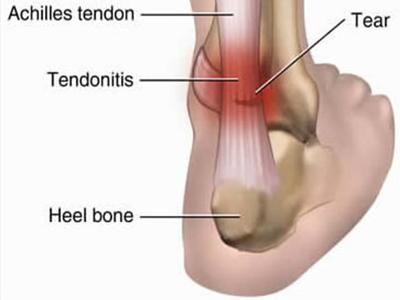
Tendinopathy, also referred to as tendonitis, is essentially irritation of a tendon somewhere in the body. A tendon is a point at which a muscle attaches onto a bone, and helps to move the bone when the muscle contracts.
Tendinopathy is different to a muscle or tendon tear as it is an overuse injury which happens over time, rather than a traumatic injury that will be painful immediately. In fact, a tendinopathy may not feel sore until a days or weeks after it has developed. Tendinopathies develop when tendons are subject to repetitive forces that they are not used to. They are often seen in athletes who have stepped up their training regime recently, or in people who have recently begun a new and more active job.
A tendinopathy can usually be recognized by pain in a tendon with a lack of traumatic injury. Often it will occur following an increase in exercise. It is most often sore at night after a day of activity or the next day, and is often made better by using the affected muscle, such as going for a walk or lifting objects.
Tendinopathies can be prevented easily by avoiding a sudden increase in activity, and instead opting for a gradual increase in activity. For example, if you decide to start training for a marathon, rather than beginning by running for 30 minutes, 5 times per week, try starting by running 2 times per week, then adding in one extra run per week until you can run comfortably 5 times per week.
Remember the key symptom of a tendinopathy is pain the next day that eases with exercise. If you are getting pain the next day it means you are overdoing it slightly and you may need to take a step back.
If you believe you may have a tendinopathy, don’t worry they are easily managed with a combination of rest and gradual strengthening until you are back at your best. Your physiotherapist can help guide you with this.
Until next time,
Josh
How to book an appointment?Recent posts
- What Is Mobile Physiotherapy? Everything You Need To Know
- Physiotherapy Exercises Following An Ankle Fracture: Safe And Effective Rehabilitation Moves
- Highest Paid Physiotherapist In Australia: How Much Do They Earn?
- Physiotherapy Referrals In Australia: What You Need To Know
- How To Rehab After A Knee Replacement Surgery